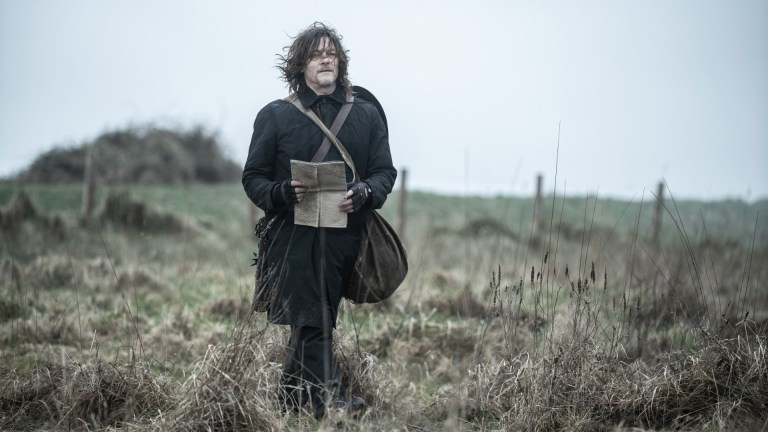The Walking Dead Just Revealed an Unexpected Detail About Daryl’s Past
It turns out the French setting for The Walking Dead: Daryl Dixon was more meaningful than we realized. Showrunner David Zabel explains.

This article contains spoilers for The Walking Dead: Daryl Dixon finale.
The mystery at the center of The Walking Dead: Daryl Dixon can be succinctly summed up as “why France?”
After 11 seasons of the flagship series taking place in the American Southeast, Mid-Atlantic, and Midwest, why did the first episode of spinoff open with the titular character drifting ashore on the beaches of Marseille? The first season’s fifth and penultimate episode answers that question to a certain extent. Daryl encountered some trouble in the U.S., was imprisoned on a French research vessel, and then threw himself overboard to avoid an amped up walker, eventually washing up in southern France.
While that explains the literal narrative reasons for Daryl’s French journey, it doesn’t quite capture the thematic reasons. What can The Walking Dead accomplish with the major character of Daryl Dixon in France that it couldn’t accomplish in North America? Well, in the season 1 finale “Coming Home” we finally get our answer. The Dixon family has a tragic history in Western Europe that Daryl needs to grapple with.
Midway through the episode, Daryl (Norman Reedus) tells his traveling companion Isabelle (Clémence Poésy,) that he isn’t the first Dixon to fight for his life in France. His grandfather, who we later find out was named William T. Dixon, left his family behind to fight in World War II. As the episode’s mysterious cold open featuring dead American soldiers on the beaches on Normandy reveals, however, he didn’t make it too far. The loss of William Dixon would reverberate through generations, leaving Daryl and his brother Merle (Michael Rooker) with a broken shell of a father to contend with.
According to The Walking Dead: Daryl Dixon showrunner David Zabel, Daryl’s tortured family history came directly from the show’s already-planned France setting.
“We were talking about ‘what could Daryl find out about himself that’s new and relevant to where he is and to the story he’s experiencing with Laurent in search of a father figure,'” Zabel says. “Then we had the idea that maybe his father was raised in a fatherless household because his father had died. We looked at some dates and were like ‘oh that’s interesting, he’s a vet. And he died in World War II!”
Writer and producer Jason Richman then came up with the idea of staging the episode’s cold open as Daryl’s grandfather’s final moments in France. This means that in addition to prominently featuring the iconic Mont-Saint-Michel for the episode’s third act, production also got to spend time at the haunting beaches of Normandy, site of the infamous Allied invasion of Europe that has been depicted time and time again throughout pop culture.
“It was really chilling to be in the actual place shooting that little piece,” Zabel says. “It’s not Saving Private Ryan but it’s still pretty graphic and evocative. It was powerful to be there.”
When Daryl decides to leave “The Nest” at Mont-Saint-Michel and return home, he makes time for a pitstop at a makeshift cemetery on the beach where he finally comes across the humble grave of his grandfather. He then has to hack through a veritable army of walkers to get off the beach, much like his grandfather once did to get on the beach.
“When he fights through those zombies at the end to get to the boat, he’s in a way traveling the opposite course that his grandfather traveled 80 years ago,” Zabel says.
“Coming Home” concludes with Daryl facing a choice: remain in France to protect and shepherd Laurent (Louis Puech Scigliuzzi) or return home to his “real” family in America. Again, it’s a mirror to the possibilities that William Dixon confronted nearly a century ago himself. It’s unclear what will happen to Daryl, Laurent, and even Carol in the already-confirmed The Walking Dead: Daryl Dixon season 2. But for now, Zabel and his writing staff are pleased with how they’ve delved into Daryl’s family history in season 1.
“The backstory of Daryl’s grandfather was a character version of what we’re trying to do with the whole show,” Zabel says. “The entire show was meant to be consistent with The Walking Dead, to be truthful to The Walking Dead, and to maintain the standards of The Walking Dead but to also add new elements, new energies, and new ideas.”
